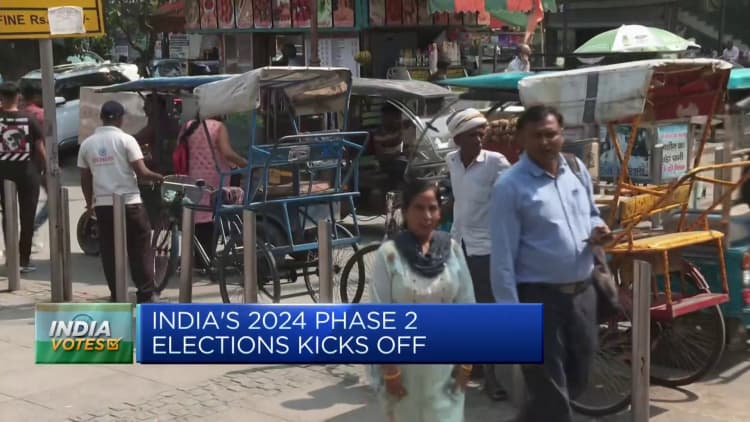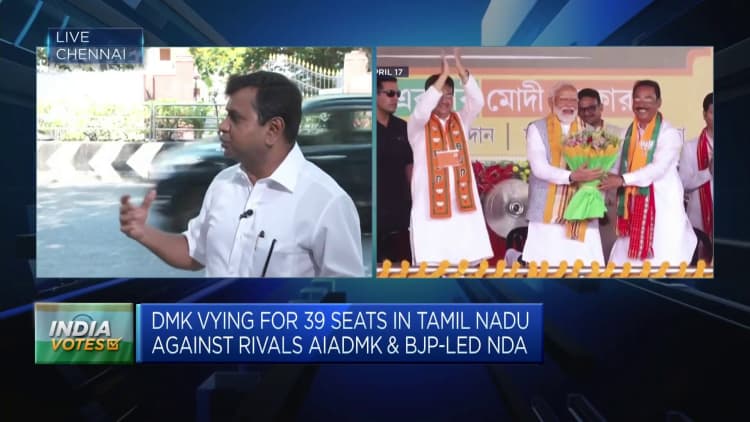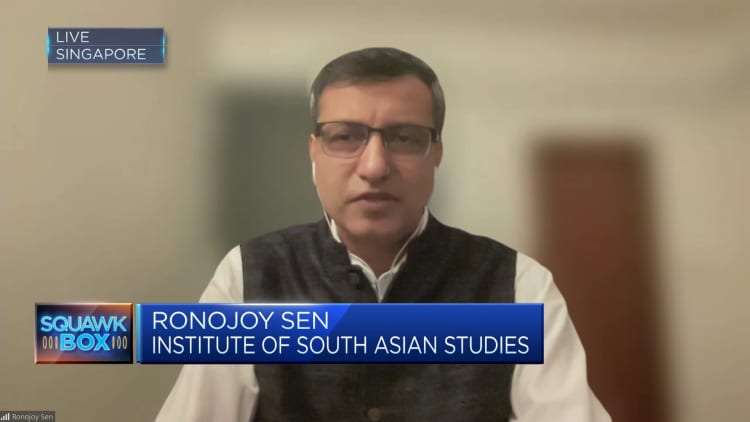Narendra Modi, India’s prime minister, center, during a campaign rally in Agra, Uttar Pradesh, India, on Thursday, April 25, 2024. Modi doubled down on his attacks against the main opposition party by using language critics say sows division between the country’s Hindu majority and Muslim minority. Photographer: Prakash Singh/Bloomberg via Getty Images
Bloomberg | Bloomberg | Getty Images
A decade into power, India’s Prime Minister Narendra Modi appears set to secure a rare third term, with the general elections now underway.
Under his rule, India’s economic growth has been robust and its geopolitical standing in the world has risen.
Yet, the country has also witnessed signs of democratic backsliding which has become apparent during his leadership, observers and critics say.
“Modi has projected himself in the mould of an East Asia strongman,” Asim Ali, an independent political researcher in New Delhi, told CNBC.
He has also been called “the high priest of India — that he is above all politics,” Ali added. “This is very worrying as mixing religious nationalism with economic development” has been a “central feature” of his government.
In its latest 2024 report, the Sweden-based V-Dem Institute said a third Modi term could worsen the political situation “given the already substantial democratic decline under Modi’s leadership and the enduring crackdown on minority rights and civil society.”

The U.S. research group Freedom House said Indian elections will be taking place in a media landscape characterized by increasing “legal attacks on critical journalists” and news outlets.
There is no question the “space for democracy between elections has shrunk” under Modi, Milan Vaishnav, South Asia director at the Carnegie Endowment for International Peace, told CNBC.
“Today, the liberal character of India’s democracy is less apparent,” he added, with “rising majoritarianism, weakening checks on executive authority and a growing intolerance for dissent.”
Last year, the government slammed a BBC documentary — which questioned Modi’s alleged role during the 2002 deadly Gujarat riots — and blocked social media platforms from sharing any clips of it.
Many Indian mainstream media, especially the Hindi-speaking outlets, have been “co-opted” to spread propaganda to deliver “the government message,” according to Ali.
India shuts down the internet more than any other country, with authorities frequently using such tactics to stem political protests and suppress criticism, rights groups say.
In a recent Newsweek interview, Modi addressed the issues and called India the “mother of democracy.”
“Our media plays an important role in this regard,” he said, dismissing claims of “diminishing media freedom” in India as “dubious.”
The prime minister’s office and the ruling Bharatiya Janata Party did not respond to CNBC’s request for comment.
Opposition ‘witch hunt’
Ahead of the elections, India’s main opposition — the National Congress party — accused the Modi government of freezing its bank accounts.
“This is a criminal action on the Congress party done by the prime minister and the home minister,” said Congress leader Rahul Gandhi in a fiery attack.
“It is being orchestrated to cripple us before the elections,” he claimed, adding the people were being “robbed of their constitution and democratic structure.”
The Modi administration rejected the opposition’s allegations.

Previous governments have also pursued “a witch hunt against opposition politicians,” said Chietigj Bajpaee, a senior research fellow for South Asia at Chatham House.
But the scale of “actions by the Modi government is what makes it more alarming,” since it has “employed key levers of power” to intimidate opponents, he added.
India’s Supreme Court recently granted an interim bail to jailed Delhi chief minister Arvind Kejriwal, a vocal political rival of Modi, who was arrested in March under a bribery case. The arrest raised eyebrows as he was the leader of India’s Aam Aadmi Party, a key player in a larger opposition alliance.
The timing was “unusual” as it came just before the elections, said Bajpaee. It appears the government doesn’t “want to leave any stone unturned” in its stated target of securing 400 seats in the Lok Sabha or lower house of parliament, he added.
‘Pro-Hindu party’
In the last decade, Modi’s BJP has become emboldened in pushing its Hindu nationalist ideology, say analysts. The aim was to consolidate its support among the Hindus, who make up 80% of the country’s 1.4 billion population.
“The BJP is an avowedly pro-Hindu party,” said Vaishnav. Since coming to power in 2014, but especially post-2019, it has “sought to use law, regulation, and even civil society to promote its agenda,” he added.
Pedestrians watch as a screen broadcasts footage of an inauguration ceremony for the Ram Temple in Ayodhya, attended by Prime Minister Narendra Modi, at a public venue in New Delhi, India, on Monday, Jan. 22, 2024. Modi fulfilled his party’s decades-long promise by consecrating a major Hindu temple in northern India. Photographer: Prakash Singh/Bloomberg via Getty Images
Bloomberg | Bloomberg | Getty Images
In January, Modi inaugurated a controversial temple in the city of Ayodhya — at the site where an ancient mosque was demolished by a Hindu mob — fulfilling a decades-long campaign promise.
“The temple issue would matter in the Hindi-speaking belt, especially to energize the Hindu base,” said Ali, adding the government has also used “anti-Muslim” rhetoric during the election campaign.
Modi was accused of hate speech recently after he reportedly called Muslims “infiltrators” at a rally, seen as undermining India’s secular constitution.
The Modi government’s “talk of establishing a ‘Hindu Rashtra’ or Hindu nation does indicate ambitions to demolish the divide between state and religion,” noted Bajpaee, warning this could “erode India’s secular credentials.”
Cult-like status?
Yet, public backlash against Modi’s hardline rule has been limited. His charisma and persona have made him incredibly popular both at home and abroad.
“There’s no one in the opposition to match that kind of popularity,” said Ronojoy Sen, senior research fellow at the Institute of South Asian Studies, in a recent CNBC interview.
Political watchers argue Modi benefitted from a cult-like status created around him — backed by the ruling party’s formidable election machinery — to build a direct connection between him and voters.
For those unhappy with the country’s direction “to vote out the BJP means they have to get rid of Modi,” said Neelanjan Sircar, a senior fellow at the Centre for Policy Research in New Delhi. That becomes “hard to do if voters identify with him.”

His populist appeal has endured despite India’s entrenched economic problems such as rising youth unemployment and growing wealth inequality.
A CSDS-Lokniti pre-poll survey showed Modi was way ahead in popularity with 48% of the respondents picking him as their choice for prime minister compared with his opposition rivals.
India’s economic progress was not “obviously, worse before Modi came to the scene,” noted Sircar. “During Manmohan Singh’s time, India was also growing very fast,” he added, referring to the economic reforms under the former prime minister in the 1990s.
“What has changed is the way in which everything is branded in Modi’s image.”
Even the BJP’s manifesto is called “Modi Ki Guarantee” — or Modi’s guarantee, Sircar pointed out, adding that the entire political system “is geared towards positive attribution to the top.”
‘Big changes’
With election results due in early June, it has been widely expected the prime minister and the BJP will cruise to victory for a third term, given India’s feeble opposition.
A reelected Modi government will be “more forceful” in pushing ahead with “politically sensitive economic reforms and its more divisive identity-driven agenda,” said Bajpaee, from Chatham House.
In a recent Interview, Modi exuded confidence and said he wanted to make India “the third economic superpower,” outlining his bold vision.
The Indian leader will “flex his muscles” to enact significant legislation on a strengthened mandate, added Carnegie’s Vaishnav.
“Modi has already prepared the electorate to expect ‘big changes‘ once they’re brought back to power,” he added.







